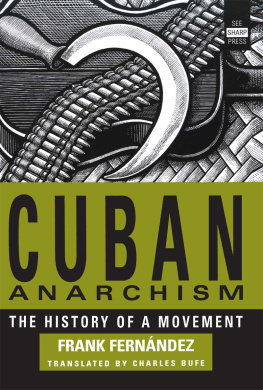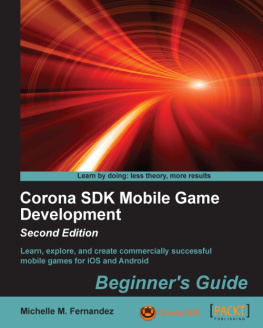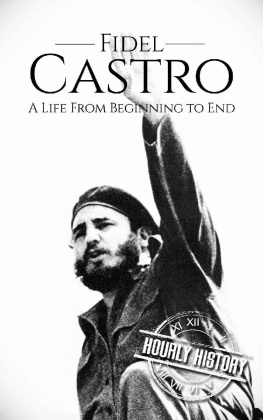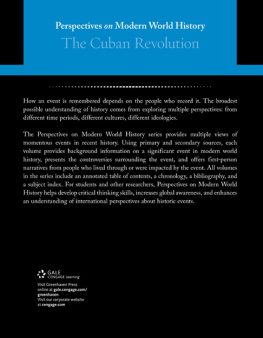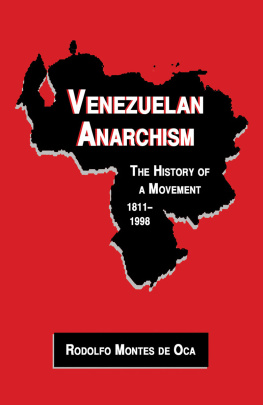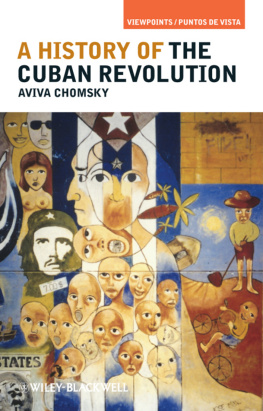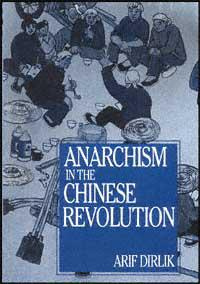Fernández - Cuban anarchism: the history of a movement
Here you can read online Fernández - Cuban anarchism: the history of a movement full text of the book (entire story) in english for free. Download pdf and epub, get meaning, cover and reviews about this ebook. City: Kuba;Tucson;Ariz, year: 2001, publisher: See Sharp Press, genre: Politics. Description of the work, (preface) as well as reviews are available. Best literature library LitArk.com created for fans of good reading and offers a wide selection of genres:
Romance novel
Science fiction
Adventure
Detective
Science
History
Home and family
Prose
Art
Politics
Computer
Non-fiction
Religion
Business
Children
Humor
Choose a favorite category and find really read worthwhile books. Enjoy immersion in the world of imagination, feel the emotions of the characters or learn something new for yourself, make an fascinating discovery.
Cuban anarchism: the history of a movement: summary, description and annotation
We offer to read an annotation, description, summary or preface (depends on what the author of the book "Cuban anarchism: the history of a movement" wrote himself). If you haven't found the necessary information about the book — write in the comments, we will try to find it.
Fernández: author's other books
Who wrote Cuban anarchism: the history of a movement? Find out the surname, the name of the author of the book and a list of all author's works by series.
Cuban anarchism: the history of a movement — read online for free the complete book (whole text) full work
Below is the text of the book, divided by pages. System saving the place of the last page read, allows you to conveniently read the book "Cuban anarchism: the history of a movement" online for free, without having to search again every time where you left off. Put a bookmark, and you can go to the page where you finished reading at any time.
Font size:
Interval:
Bookmark:
Copyright 2001 by Frank Fernandez.
Translation copyright 2001 by Charles Bufe.
All rights reserved.
For information contact See Sharp Press,
P.O. Box 1731, Tucson, AZ 85702-1731.
Web site: www.seesharppress.com
Free catalog upon request.
Fernandez, Frank.
Cuban anarchism : the history of a movement / Frank Fernandez ; introduction by Chaz Bufe. - Tucson, Ariz. : See Sharp Press, 2001.
154 p. : ill. ; 23 cm.
Includes bibliographical references and index.
ISBN 1-884365-19-1
1. Cuba - Politics and government. 2. Anarchism - Cuba - History. 3. Anarchists - Cuba - History 4. Syndicalism - Cuba - History. 5. Labor movement - Cuba - History. 6. Trade-unions - Cuba - History. 7. Trade-unions and communism - Cuba - History. I. Title.
335.83097291
First Edition
Cover design by Clifford Harper. Interior design by Chaz Bufe. Printed in USA by Thomson-Shore, Inc. on acid-free paper with soy-based ink .
Dedicated to the memory of Maria Teresa
Dearly beloved and sorely missed
Your patience and love will
Live in our hearts
Index
This is not a conventional history. Rather, its a tribute, an homage to the thousands of Cuban anarchists who worked over the course of more than a century to build a freer, juster world, and who, but for this book, would remain almost entirely forgotten. That would be a tragedy, as virtually all of them were idealistic, admirable human beings, and many were truly heroic. All are more deserving of historical remembrance than such power-hungry dictators as Gerardo Machado, Fulgencio Batista, and Fidel Castro.
The author of this work, Frank Fernandez, has been a member of the Movimiento Libertario Cubano en el Exilio (MLCE) for decades, and was the editor of its long-running periodical, Gungara Libertaria, for which he wrote easily half a million, and perhaps a million, words on Cuban history and politics. He is also the author of the book, La sangre de Santa Agueda, which deals with a pivotal event in Spanish and Cuban history, the assassination of the Spanish premier Cnovas del Castillo in 1897.
Like the other members of the MLCE and their predecessors in Cuba, Frank has done his political work in his spare timeafter his day job as a mechanical engineerand has never received a dime for his countless hours of work on behalf of Cuban freedom. He writes here from deep conviction and also from a deep knowledge of the history of Cuba and its anarchist movement. That knowledge includes personal acquaintance with most of the Cuban anarchists mentioned in , whose testimony and remembrances form the backbone of those chapters.
In reading this history of Cuban anarchism, one is struck both by the immense courage and dedication of the Cuban anarchists, and by the lessons to be learned from their struggles. A particularly poignant lesson is that concerning so-called wars of national liberation. In the 1890s, Cubas large and powerful anarchist movement split over the question of whether or not to participate in the national independence struggle. A great many anarchists defected to the independence movement, but that movement proved to be a disaster both for the anarchists, who were seriously weakened, and for Cubas people as a whole, hundreds of thousands of whom died in the conflict. In the end, nothing worthwhile was achievedSpanish colonialism was replaced, but by a republic in the hands of the sugar barons and beholden to foreign financial interests. At least some Cuban anarchists evidently learned from this fiascothat its always a mistake for anarchists to put aside their principles and support would-be governors, no matter how nationalist or progressivebut a great many other anarchists evidently didnt.
Twenty years after this Cuban disaster, large numbers of the worlds anarchists (including many Cubans) threw their support to the Bolshevik government after the 1917 Russian revolution. Despite growing evidence of the brutal, totalitarian nature of the Communist regime, many anarchists continued to support it until well into the 1920s, when two well known and respected anarchists, Alexander Berkman (in The Russian Tragedy and The Bolshevik Myth) and Emma Goldman (in My Disillusionment in Russia and My Further Disillusionment in Russia) revealed the truth. Even then, some anarchists refused to surrender their illusions about the nature of the workers state.
This situation repeated itself with Castros rise to power in 1959. A great many anarchists, especially in Europe, were so desperate to see positive social change that they saw it where there was nonein Cuba, thanks in part to a skilled disinformation campaign by Castros propaganda apparatus. Despite suppression of civil liberties, the prohibition of independent political activity, the government takeover of the unions, the militarization of the economy, the gradual impoverishment of the country (despite massive Soviet economic aid), the reemergence of a class system, the institution of a network of political spies in every neighborhood (the so-called Committees for the Defense of the Revolution), and the government-fostered personality cults which grew up around Fidel Castro and Ernesto (Che) Guevara, large and important sections of the worlds anarchist movement supported Castro until well into the 1970s.
That situation began to change in 1976 with publication of the respected American anarchist Sam Dolgoffs The Cuban Revolution: A Critical Perspective. But even today some anarchists continue to be hoodwinked by the Castro regimes revolutionary rhetoric and the veneer of social welfare measures with which it covers its ruthless determination to cling to power at any price.
The Cuban experience provides us with valuable lessons. Two of the most important are that anarchists should never support marxist regimes, and that they should be extremely wary about supporting, let alone participating in, so-called wars of national liberation. These are the negative lessons to be learned from the history of Cubas anarchists. The positive lesson is that it is possible to build a large, powerful revolutionary movement, despite lack of physical resources, through dedication and hard work.
Before going on to the body of this book, its necessary to consider the ideology of Cubas anarchists. Because there are so many popular misconceptions about anarchism, its imperative to clarify what anarchism is and what it isnt. First, what it isnt:
Anarchism is not terrorism. An overwhelming majority of anarchists have always rejected terrorism, because theyve been intelligent enough to realize that means determine ends, that terrorism is inherently vanguardist, and that even when successful it almost always leads to bad results. The anonymous authors of You Cant Blow Up a Social Relationship: The Anarchist Case Against Terrorism put it like this:
The total collapse of this society would provide no guarantee about what replaced it. Unless a majority of people had the ideas and organization sufficient for the creation of an alternative society, we would see the old world reassert itself because it is what people would be used to, what they believed in, what existed unchallenged in their own personalities.
Proponents of terrorism and guerrillaism are to be opposed because their actions are vanguardist and authoritarian, because their ideas, to the extent that they are substantial, are wrong or unrelated to the results of their actions (especially when they call themselves libertarians or anarchists), because their killing cannot be justified, and finally because their actions produce either repression with nothing in return, or an authoritarian regime.
Next pageFont size:
Interval:
Bookmark:
Similar books «Cuban anarchism: the history of a movement»
Look at similar books to Cuban anarchism: the history of a movement. We have selected literature similar in name and meaning in the hope of providing readers with more options to find new, interesting, not yet read works.
Discussion, reviews of the book Cuban anarchism: the history of a movement and just readers' own opinions. Leave your comments, write what you think about the work, its meaning or the main characters. Specify what exactly you liked and what you didn't like, and why you think so.

